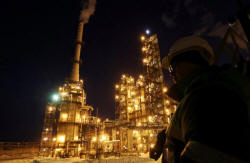|
Oil slips toward $47 as
hopes for producer action wane
 Send a link to a friend
Send a link to a friend
 [September 06, 2016]
By Alex Lawler [September 06, 2016]
By Alex Lawler
LONDON (Reuters) - Oil slipped toward
$47 a barrel on Tuesday, falling further from the previous session's
one-week high on receding hopes for imminent action to tackle a
supply glut.
Saudi Arabia and Russia agreed on Monday to cooperate in world oil
markets, prompting Brent to jump almost 5 percent only to pare gains
after Saudi Energy Minister Khalid al-Falih said there was no need
to freeze output for now.
Brent crude for November was down 28 cents at $47.35 a barrel by
0946 GMT. U.S. crude for October, which did not settle on Monday due
to the Labor Day holiday, was at $44.96, up 52 cents from Friday's
close.
While the Saudi minister played down the prospect of imminent
action, his Russian counterpart Alexander Novak said he was open to
ideas on what cut-off period to use if countries chose to freeze
output and even said production cuts may be discussed.

"Differences still remain and will reinforce already heightened
levels of scepticism that supply will soon be restrained," said
Stephen Brennock of oil broker PVM.
Oil prices are half their level of mid-2014, hurting producing
nations' income. OPEC and Russia tried earlier this year to curb the
glut by seeking an output freeze, but the deal collapsed in April
due to tension between Saudi Arabia and Iran.
The Organization of the Petroleum Exporting Countries and non-OPEC
producers such as Russia will hold informal talks in Algeria on
Sept. 26-28. Others in the market are skeptical a deal will happen.
"The two nations' cooperation is understandable," said Kaname Gokon,
a strategist with Okato Shoji Co Ltd.
"But when oil output is reduced, other producers would receive the
benefit. There is still a question whether they can cut production
for a sustainable period."
[to top of second column] |

A worker looks on at the Bashneft-Ufaneftekhim oil refinery outside
Ufa, Bashkortostan, Russia January 29, 2015. REUTERS/Sergei
Karpukhin/File Photo

Iran, which is raising exports after the lifting of Western sanctions in
January, refused to participate in the earlier effort to freeze output. Saudi
Arabia insisted all producers take part, prompting the collapse of the talks.
By some measures, Iran is pumping at its pre-sanctions rate. OPEC and industry
sources have said Tehran now appears to be more willing to reach an
understanding with other producers.
OPEC Secretary-General Mohammed Barkindo met Iranian Oil Minister Bijan Zanganeh
in Tehran on Tuesday. Zanganeh, after the meeting, voiced support for steps to
boost prices, without specifying whether Iran would join such an effort.
(Additional reporting by Osamu Tsukimori; Editing by Dale Hudson)
[© 2016 Thomson Reuters. All rights
reserved.] Copyright 2016 Reuters. All rights reserved. This material may not be published,
broadcast, rewritten or redistributed.
 |